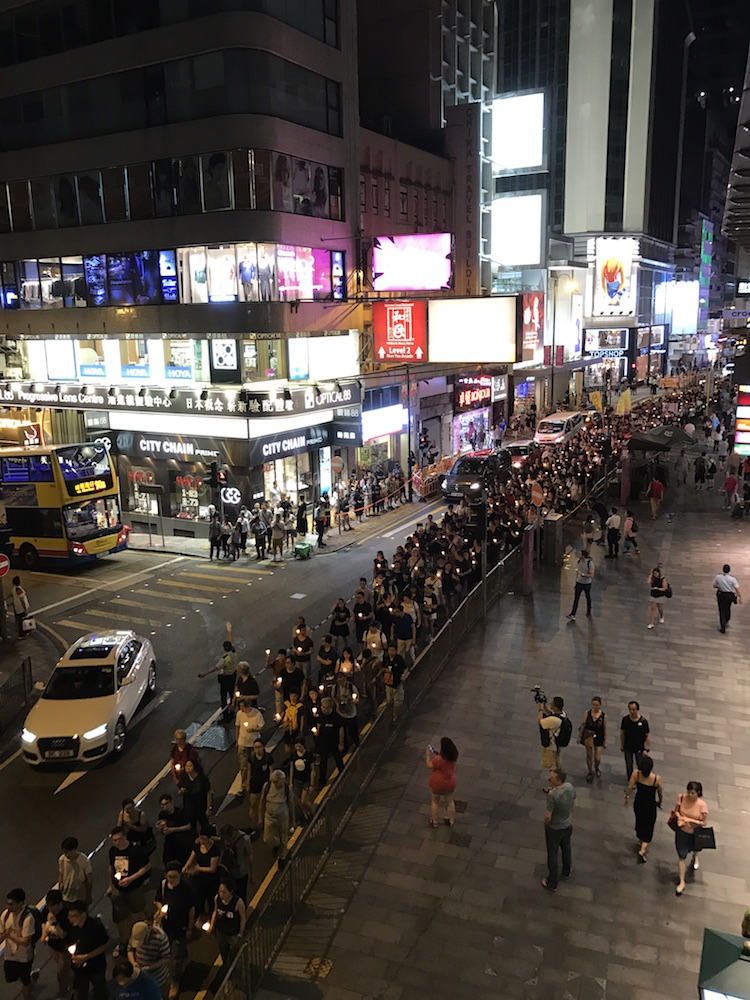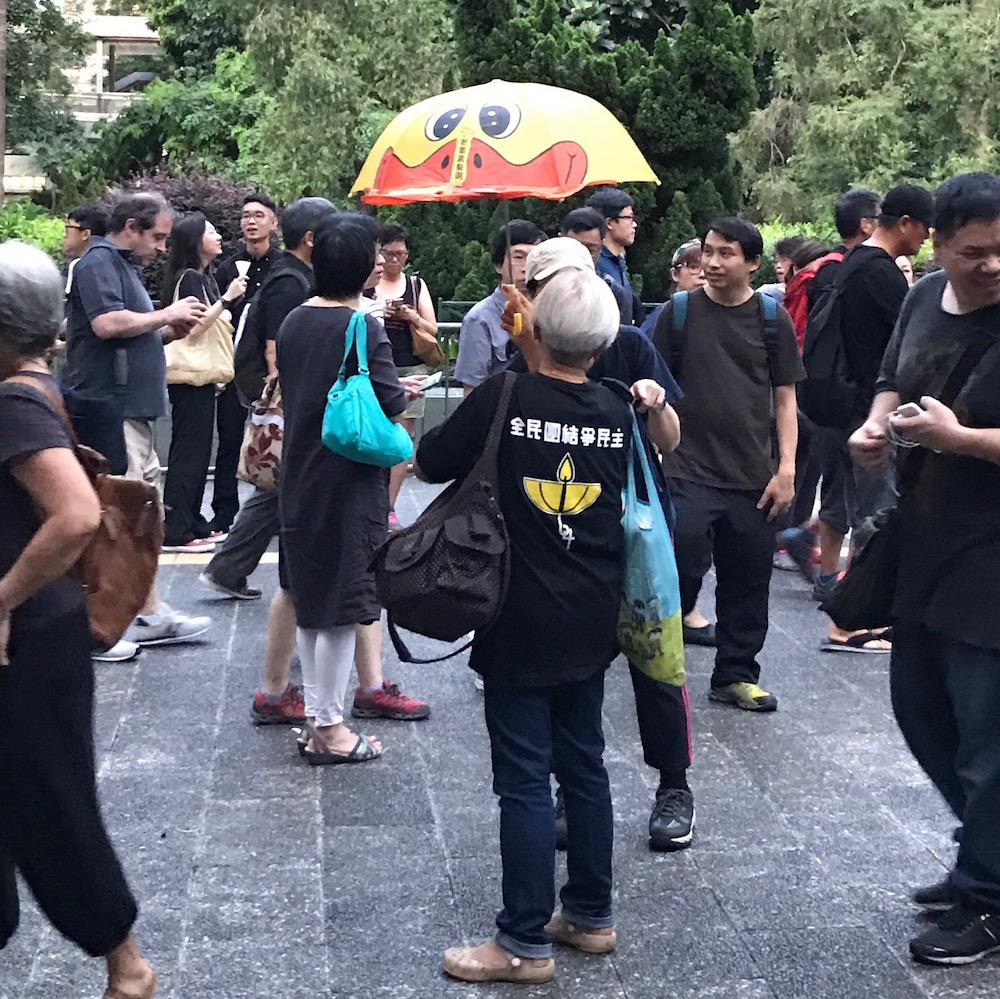By Yvonne Yevan Yu
It was a day of migrating rainclouds, which meant random gusts, a thickness almost tangible on one’s skin, and sunlit downpours. Summer rains in Hong Kong are equally quick in temper and forgiveness. The whole world darkens, the deluge like distant applause, then just as unexpectedly the air is open again, with a luminous clarity. Car windows and the rush beneath gutters are the only evidence of what had passed.
Our silent river, in memory of Liu Xiaobo, passed through the gorges of Queens Road Central. Around us the edifices of glass and steel bore their billboards and late night workers, seemingly inured to the procession below. Holding candles with their makeshift aprons, we were obliged to walk slowly, wax dripping onto our fingers, as we followed the pace of the portrait bearers ahead. I tried shielding my flame, which was shaking and shrinking into a speck and back, even though I felt no breeze. We walked five or six deep along one lane of traffic that was cleared for us. Police officers were stationed along the stretch of our route, holding cordons in place and making directing gestures with stiff palms. When we reached the intersection at Ice House Street, we found the steep slope filled with cars stopped at a green light, with nowhere to go — our march was in the way. As we turned to face them, one car began to honk, which led to a chorus of horns. Some marchers, perhaps thinking that the drivers were expressing solidarity, raised their candles as they passed. A woman who looked to be about my mother’s age, who had been holding hands with her husband since we started walking, turned and leaned over the barriers without letting go of her grip.

“Hey,” she said, pointing to the policeman nearest to us. “Didn’t you plan for this? Let them through!”
Our policeman asked us to keep walking, which only increased her agitation. She repeated her request, as did he. A few paces off at another intersection, a tall traffic cop stood in a wide-legged stance, his patent leather boots stopping at his knees, his limbs at straight angles. He ignored the escalating argument.
The woman tried to start a chant — “Make way! Make way!” — but did not succeed in rousing the crowd. Her husband tugged at her to go on.
“Lady, this is a silent vigil,” a man said, not unkindly.
“I know,” she said. “But if the cops don’t let the cars through, everyone’s going to blame us for obstructing traffic again. They’re doing it on purpose, making us look bad.” She stood her ground, still holding onto her husband’s hand. “Thug police! Make way!”
Several marchers decided to take the lead. They told those behind them to stop walking, with the awkwardness of one unaccustomed to giving orders to strangers. The policeman nearest to us waved the cars through.
The woman pressed onto the barriers again, before moving away. “You’re all corrupt. Thugs!”
About an hour earlier, we had gathered in Statue Square for the starting point of the march, most of us clothed in black. The mood was funereal, with a tense energy, causing tourists crossing the space to pause and wonder, their suitcases in mid-rotation. We lined up for our candles, signed our names in a guestbook not unlike the clothbound ledgers at a wedding, and listened to Liu Xiaobo’s words, as read by the host of the event. Several speakers gave eulogies, tying his death to the future of our city. “Live well,” he had said, as part of his goodbye to his wife, Liu Xia, an exhortation that was repeated from the lectern to us. The middle-aged couple in front of me moved towards each other.
The emotions of mourning were perhaps sharpened by vestiges of President Xi’s visit two weeks ago, to mark the 20th anniversary of Hong Kong’s handover. A giant art installation next to the square was built in commemoration of the occasion, its colorful cast of characters both flashy and unremarkable, like an extravagant wallpaper pattern. The day before the vigil, local courts had, based on a legal interpretation by the mainland, disqualified four democratically elected lawmakers who campaigned on platforms of self-determination. When we passed the cops on Queens Road, I was reminded of scenes from Hong Kong’s Occupy movement a few years ago, and I wondered if they had brought teargas canisters just in case. As I eased out from behind my fellow marchers for a breather, my longsuffering candle went out. Without pausing in his stride, a man with a fannypack and a printout picture of Liu held in front of him tipped his wick towards mine, nodding in acknowledgement. I looked back towards the square, which was several bends away. There were lights everywhere — our advancing candles, streetlamps, fluorescent store signs and advertisements, the glow of trading floors in buildings.
We were moving as closely to each other as the starting section of a marathon. The heat from my renewed candle didn’t feel much more than the night’s mugginess, and I had reached the point where the only option was acceptance — that I was only ever going to be hot and saturated with sweat in the near future, and there was little I could do but stay hydrated. As I was holding my arms away from my body in a futile attempt to ventilate, I was rewarded with an icy blast, the first of many along our passage: the great structures along our path belied their smooth, hardened exteriors, as we were met with a free flow of perfume and overcranked AC. The high-end shops on the ground floor of these buildings had their doors open to us, possibly because their shoppers were standing there watching our progression, and we slowed down for the welcome draught. Occasionally, the curious shoppers, as well as journalists planted among us, would wave to a marcher that caught their eye, drawing us out like a sandbar from a current. They asked questions about the vigil, our impressions of Liu Xiaobo, our thoughts on the government up north that has recently felt very near. I passed a young woman facing a microphone, her face blown out by the cameraman’s spotlight.
“Because there’s no other way to express our voices as a people,” she said. Others stopped to listen. “I feel we have as little control over our future as the weather.”
An enterprising videographer had balanced himself on a lamppost, filming one-handedly. One man was gesticulating to a reporter.
“He was a patriot,” the man said. “He was dedicated to his country.”
“Do you feel that the act of demonstration is ultimately futile?” The reporter asked. “Many have said so.”
A storm began when my section reached Sheung Wan. Umbrellas popped up along the narrowing lane. It was dark by now, the sky above a muddy charcoal pierced with a hard rain that rebounded from the asphalt and doubly drenched our feet. Several marchers ahead of me were sharing umbrellas, their calves streaked with gravel and rain, their candles held close. High-flying flags with the names of the vigil organizers, periodically spaced along the march, grew laden as the downpour increased in strength. We were passing under a pedestrian bridge, which were filled with onlookers, like balcony patrons at the theater. It seemed like a good vantage point, so I slipped out of the procession for the stairs.

“Careful with your phone,” said a policewoman on the walkway. Her object of caution was reaching across the railings for a photo, his arms suspended over the street.
“It’s stopped raining,” he said, addressing no one.
I edged into the space beside him and peered over — the river below us was one bright, moving entity. But I recognized, crossing underneath, the handholding couple; a young student, with a bouquet of flowers she meant to lay at the memorial by the march’s end, in front of the Liaison Office with Beijing; an elderly woman with her yellow umbrella shaped like the beak of a duck, the prop as at home in her grandchild’s kindergarten as at an Occupy event; a man who had brought his dog with him, its small figure panting in a carrier slung across his chest. The column stretched as long as the road, moving firelight against black shirts. It occurred to me that I could just as easily encounter those individuals, hike-happy as we are as a people, on a trail in Sai Kung, or by a reservoir; walking in Hong Kong has become an expression, whether it is for leisure or in protest.
Resting against a traffic cone, the man being asked about the futility of demonstrations paused and eyed the other marchers.
“There was news earlier that Liu Xia is still being held,” said the reporter. “do you think she has hope for what’s to come?”
The way the man frowned suggested that he thought it was an unanswerable question. “I hear she’s not well physically,” he said, considering his words. “And I hear they can’t mourn him publicly in the mainland. But I hope that she sees us and what we’re doing here, and is strengthened by that.”
Yvonne Yevan Yu, a native of Hong Kong, is a writer and filmmaker. She is currently an MFA candidate at Brooklyn College.


